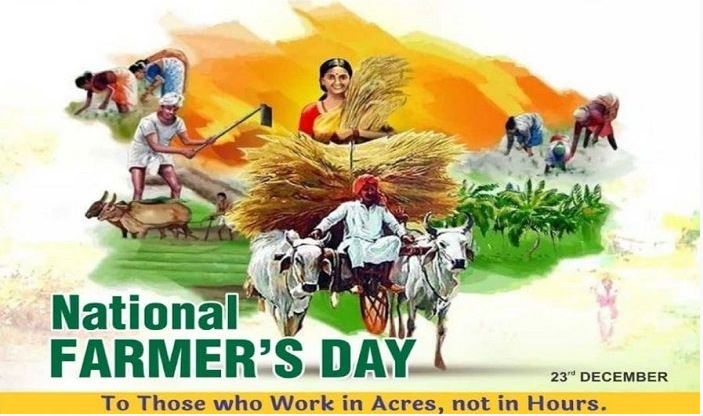
As we celebrate National Farmers’ Day (Kisan Diwas) on December 23, I reflect on this year’s theme: “Empowering ‘Annadatas’ for a Prosperous Nation.” Infact, this day holds immense significance as it honors the contributions of farmers to our economy. However, it also sheds light on the pressing issues they face, particularly regarding farmers’ rights. In this blog, I will discuss the ongoing challenges farmers encounter and advocate for their rights.
The Importance of Farmers’ Rights
Farmers’ rights are crucial for ensuring their livelihoods and well-being. These rights encompass fair pricing, access to resources, and protection from exploitation. Unfortunately, many farmers in India struggle to secure these basic rights. Pointedly, the current agitation in Delhi highlights their plight and demands urgent attention.
When I think about farmers’ rights, I remember their vital role in feeding our nation. According to recent statistics, nearly 58% of India’s population relies on agriculture for their livelihood. Yet, despite their contributions, farmers often receive inadequate support. This disparity fuels frustration and unrest among them.
The government must recognize the importance of farmers’ rights. Without these rights, farmers cannot thrive or contribute effectively to our economy. As we commemorate National Farmers’ Day, we must advocate for policies that protect and empower them.
Key Issues Facing Farmers Today
Farmers today face numerous challenges that hinder their ability to thrive. Undoubtedly, one major issue is the lack of legal guarantees for Minimum Support Price (MSP). Apparently, many farmers rely on MSP to ensure fair compensation for their produce. However, current policies only offer MSP for select crops, leaving many vulnerable.
Additionally, climate change poses a significant threat to agriculture. In addition, erratic weather patterns lead to crop failures and financial instability. According to a report by the Indian Council of Agricultural Research (ICAR), climate change could reduce crop yields by up to 25% by 2050. Incidentally, this situation underscores the need for effective policies that support farmers in adapting to changing conditions.
Moreover, access to modern technology remains a challenge. Besides, many farmers lack the resources needed to adopt sustainable farming practices, that includes ensuring soil health. Consequently, this gap limits their productivity and income potential. Hence, we must address these issues to safeguard farmers’ rights and ensure their livelihoods.
The Current Farmers’ Agitation: A Fight for Farmers’ Rights
The ongoing farmers’ agitation in Delhi has brought attention to these pressing issues. Thousands of farmers have gathered to demand their rights and seek justice. Clearly, they want a legal guarantee for MSP and better access to resources.
During my research, I found that many farmers feel unheard by the government. Also, they argue that previous promises remain unfulfilled. Moreover, the lack of dialogue has intensified their frustration. As a result, protests continue across the country.
This agitation is not just about immediate demands; it represents a broader struggle for farmers’ rights. Farmers want recognition of their contributions and assurance that their voices matter in policy-making processes.
Government Response to Farmers’ Demands
The government’s response to farmers’ demands has been mixed at best. While officials have engaged in discussions with farmer unions, many feel that progress is slow. Agriculture Minister Arjun Munda has stated that the government is open to dialogue but has yet to meet key demands.
Farmers are calling for concrete actions rather than mere promises. They want a commitment to implement legal frameworks that protect their rights and ensure fair compensation. Without these changes, trust between farmers and the government will continue to erode.
As I reflect on this situation, I wonder how we can bridge this gap between farmers and policymakers. It requires genuine engagement and a willingness to listen to farmers’ concerns.
Long-Term Solutions for Empowering Farmers’ Rights
To address these challenges effectively, we need long-term solutions that prioritize farmers’ rights:
- Legal Guarantee of MSP: Establishing a legal framework for MSP would stabilize incomes and ensure fair compensation.
- Investment in Infrastructure: Improving storage facilities and transportation networks can reduce post-harvest losses.
- Access to Technology: Providing training and resources can help farmers adopt sustainable practices.
- Debt Relief Programs: Implementing comprehensive debt relief measures can alleviate financial burdens on farmers.
These solutions require collaboration between the government, civil society, and agricultural organizations. As we celebrate National Farmers’ Day, let’s advocate for these changes together.
Conclusion: A Call for Action
On this National Farmers’ Day, we must recommit ourselves to advocating for farmers’ rights. Their contributions are invaluable, yet they face numerous challenges daily.It is time for us as citizens to support policies that protect farmers’ interests and promote sustainable agriculture. Let’s work towards ensuring that every farmer has access to fair pricing, modern resources, and protection from natural calamities.
What steps can you take today? Engage with local initiatives supporting farmers or share your thoughts on social media!
Together, we can create a brighter future for our agricultural community while honoring their hard work on this special day.
